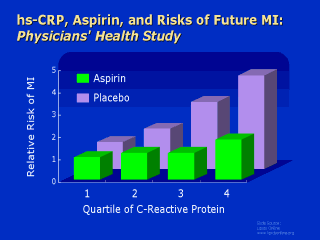 |
Standard
preventive therapies such as aspirin, estrogen-replacement therapy, and the statins have
been shown to have important effects on the inflammatory process. These aspirin data are
from the Physicians' Health Study, which was a randomized, double-blind,
placebo-controlled trial of low-dose aspirin in the prevention of first myocardial
infarction. As shown here, the magnitude of risk reduction attributable to being on
aspirin is the distance between the background placebo bars and the foreground aspirin
bars. As the level of C-reactive protein (CRP) increases, the magnitude of that difference
between treatment groups increases as well. This suggests directly that aspirin is more
efficacious in the prevention of first vascular events in the presence of a heightened
inflammatory response than in its absence. These are very intriguing data when we consider
that aspirin may have anti-inflammatory effects as well as antiplatelet effects. Reference:
Ridker PM, Cushman M, Stampfer MJ, Tracy RP, Hennekens CH. Inflammation, aspirin, and the
risk of cardiovascular disease in apparently healthy men. N Engl J Med 1997;336:973-979.
Web
site |
